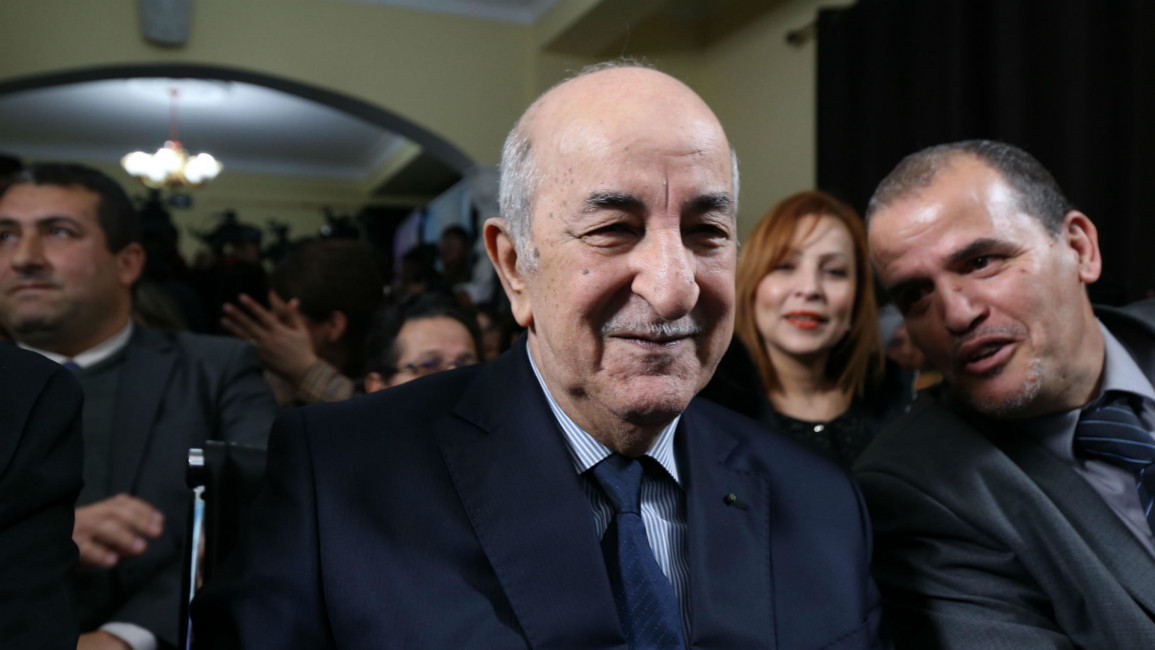Ex-PM Tebboune wins 'rigged' Algeria presidential election marred by boycotts and unrest
Tebboune, 74, took 58.15 percent of the vote, trouncing his four fellow contenders, commission chairman Mohamed Charfi announced.
Like him, they all served under the two-decade rule of Abdelaziz Bouteflika, who resigned in the face of mass protests in April.
The results came following a widely unpopular vote marred by attacks on polling stations and the lowest turnout in the country's history.
The election had been championed by the army as a way of restoring stability almost 10 months into a protest movement that in April ousted president Abdelaziz Bouteflika, 82, after two decades in office.
But on polling day on Thursday, protesters defied a heavy police presence to hold a mass rally in the heart of the capital Algiers and smaller demonstrations in provincial cities.
The results announcement could prompt tens of thousands of election opponents to pour out onto the streets in new protests.
Comment: Why we should be watching what happens in Algeria
Tebboune was one of five candidates widely shunned by protesters as "children of the regime".
Candidates Ali Benflis, 75, also served as prime minister while Azzedine Mihoubi served as a minister.
Twitter Post
|
Turnout at record low
On Thursday, a record six in 10 Algerians abstained, Charfi said, the highest rate for a multi-party election since independence from France in 1962.
Tens of thousands rallied in central Algiers, where police with water cannon and helicopters tried to disperse protesters.
"The people want independence," demonstrators chanted after breaking through a police cordon and filling the streets outside the Central Post Office, their rallying point through more than 40 weeks of protest.
In the capital, a group of protesters stormed a polling stations, suspending voting there for half an hour before police pushed them out again.
After dark, witnesses reported ongoing scuffles between police and protesters in the Belouizdad neighbourhood close to the city centre.
In the mountain region of Kabylie, home to much of the country's Berber minority and historically opposed to the central government, protesters ransacked polling stations and clashed with police, residents said.
In the city of Bejaia, two polling stations were attacked. In Tizi Ouzou, security forces fired teargas to disperse a crowd who had surrounded a government building, triggering a standoff into the night in which several people were wounded.
'Mired in crisis'
In central Algiers, young protesters slammed those casting their ballots as "traitors of the nation".
That earned a sharp rebuke from one man in his 80s: "I fought for the right to vote, so I'm voting for my country."
Other voters said they had turned out because after nearly a year of turmoil it was time for a return to stability.
"I am voting because I am afraid that the country will get mired in the crisis," said Karim, a 28-year-old civil servant.
Sid Ali, a 48-year-old merchant in Algiers, said: "I support the Hirak (protest) movement but it needs to end. I lost 70 percent of my turnover and many traders are in my situation."
'No to the system'
Whoever wins will struggle to be accepted by the electorate in the North African country, where many citizens see the government as inept, corrupt and unable to manage the flagging economy.
The "Hirak" street movement kicked off when Bouteflika announced in February that he would seek a fifth term in office.
Protesters have stayed on the streets ever since, demanding the total dismantling of the system that has ruled Algeria since independence.
Comment: Algerians, now's the time to finish what you started
The military high command, which long wielded power from the shadows, has been forced to take a more visible role and has pushed for the election as a way to withdraw behind the scenes again.
Demonstrators have vented their anger at army chief Ahmed Gaid Salah, who has emerged as Algeria's de facto strongman since Bouteflika stepped down.
A previous poll set for July was scrapped for lack of viable candidates and interim president Abdelkader Bensalah's term technically ended five months ago.



